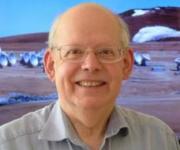Obituary: Professor Richard Hills FRS, Emeritus Fellow of St Edmund’s College
2022-06-09
It is with great sadness that we share the news that Professor Richard Hills, Emeritus Professor Radio Astronomy in the University of Cambridge and Emeritus Fellow of St Edmund’s passed away on 5 June 2022. Our thoughts are with his wife, Beverly, his family and his friends.
Richard was a wonderful colleague and a good friend to many at St Edmund’s College. His genial personality and smiling face made him a popular person to sit and chat with at college guest evenings and formal halls, for fellows and students alike. He served the college in many ways, on several committees and as the Director of Studies in Natural Science between 1990 and 2007. He enjoyed working with younger researchers and students, passing on his knowledge and expertise, and was a great supporter of the Annual Student Conference.
Richard enjoyed a highly prestigious career as a first-class scientist and project manager. He took a leading role in the development of astronomy at submillimetre wavelengths — those lying between the radio and infrared bands. He was Project Scientist for two very challenging international projects.
Richard’s first large-scale project, the James Clerk Maxwell Telescope in Hawaii, opened the submillimetre band for studying molecules in interstellar space and the formation of stars, and is particularly well known for discovering dust-shrouded massive galaxies at high redshifts. For his close involvement in its conception and design, construction and commissioning stages, he received the Jackson-Gwilt Medal of the Royal Astronomical Society.
He was a pioneer in the development of radio astronomy at millimetre wavelengths. Between 2007 and 2012 played a major role in leading an international project, the Atacama Large Millimetre/Submillimetre Array (ALMA) in Chile. This instrument has produced images with unprecedented clarity and sensitivity of objects ranging from asteroids to planet-forming discs around young stars and galaxies in the early Universe.
Richard Hills was elected a Fellow of the Royal Society in 2014 for ‘the outstanding scientific leadership shown by Richard Hills undoubtedly played a major part in the success of this challenging international project.’
We shall miss him greatly at college events, garden parties, and dinners, but will always remember his contribution to the college, the Fellowship and students with warmest affection.

